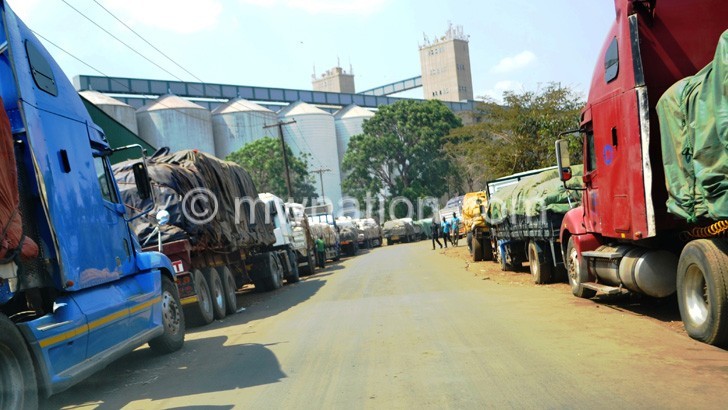Parliament shocked with NFRA’s tender cancellation
The Parliamentary Committee on Commissions, Statutory Authorities and State Enterprises, has said it is shocked with the decision by NFRA to cancel bids for maize, opting for free-for-all sales.
The committee’s chairperson Lillian Patel said in a telephone interview on Tuesday that members of her committee were shocked to learn of the cancellation barely two days after the authority assured the House committee they are about to award tenders.

She said her committee is now demanding answers from NFRA for the sudden U-turn.
“Members of the committee have asked me to summon management of NFRA. Officials from NFRA appeared before the committee last Wednesday and told us that they are about to award the tenders, and then a day or two later we hear on the radio that the bidding process has been cancelled, so we were all surprised as a committee and we feel cheated,” said Patel who is legislator for Mangochi South.
“They gave assurances that names of successful bidders will be made public by October 1.”
She also questioned the reduction of the buying price to K130 per kilogramme and whether other stakeholders should continue buying the maize at K170 per kilogramme (kg) which government set.
NFRA chief executive officer (CEO) Nasinuku Saukila told journalists last Friday in Lilongwe that the change has come about following overwhelming tender submissions showing that many people have maize for sale.
But when asked on Monday this week on how such a decision was arrived at, Saukila indicated that people should not focus on the change in the plans, but rather the general good, because as he put it, “more Malawians will now benefit because it is an open market”.
Saukila defended the downwards adjustment in the price, arguing that the statutory corporation is not after making profits but serving the public.
According to him, the overwhelming response by traders as evidenced by the hundreds of vehicles that are queuing at its depots in Kanengo in Lilongwe, Kazomba in Mzimba and Bangula in Nsanje means the sellers are happy with the price.
On his part, Minister of Agriculture, Irrigation and Water Development Joseph Mwanamvekha refused to comment when asked on whether the ministry endorsed the decision to abandon the tender system and also whether the agency is not exploiting farmers by offering K130 per kg, which is below government set minimum price of K170 per kg.
In a separate interview, spokesperson for the Ministry of Agriculture, Irrigation and Water Development Osborne Tsoka said the government to set minimum price is not binding but rather a guide for the farmers to break even considering commercial factors of production.
He said the ministry is contemplating engaging the Ministry of Industry and Trade to decide how to go around the issue in the face of a liberalised trade.
An impeccable source from Capital Hill, however, confided in this paper that officials from the Ministry of Agriculture, Irrigation and Water Development and NFRA met and discussed before announcing the free-for-all supply of maize in its 2017 maize restocking exercise. This was corroborated by a senior official who asked not to be mentioned.
Said the source: “As government, we know that we are not buying the maize from farmers but middlemen; so why should we buy at K170 per kg? Farmers were already exploited because money meant to purchase the maize was released late. What we want is to get better value for money and buy more produce. We are hoping that next year funds will be made available in good time so that farmers should benefit.”
Commenting on the issue, Farmers Union of Malawi (FUM) acting spokesperson Jacob Nyirongo observed that if the price offered to farmers is low, they end up making losses.
He further indicated that NFRA is not present in all districts in the country as is the case with Admarc, which means farmers are incurring huge costs in terms of transport to get their produce to the nearest point of sale.
Said Nyirongo: “Admarc is a better player because it is closer to the farmer. If you consider the queues that are at Kanengo and the long wait that the farmers will have to endure to sell their maize, it’s not at all profitable.”
Another contentious issue is the money realised through the tendering system, which Saukila put at K12 million from close to 2 400 bids. Bidders were paying K5 000 for a bid document. But Saukila said the money is non-refundable citing the expenses NFRA incurred to produce the documents.
“People need to appreciate that both the bidders and NFRA have spent but we were not after making money,” he said.
Saukila also dismissed reports that some people were told of the changes in the buying system ahead of time and sent their trucks on or before the announcement.
NFRA has been given K5.4 billion and is expected to purchase 80 000 metric tonnes of the grain. It opened bids on September 9 and 10, 2017 when it announced that in its restocking exercise, it will receive maize from Admarc and direct procurement through tender.
NFRA is a government agency with a mandate to purchase and store grain for sale at an affordable price when the private sector fails to meet the market signals. n





